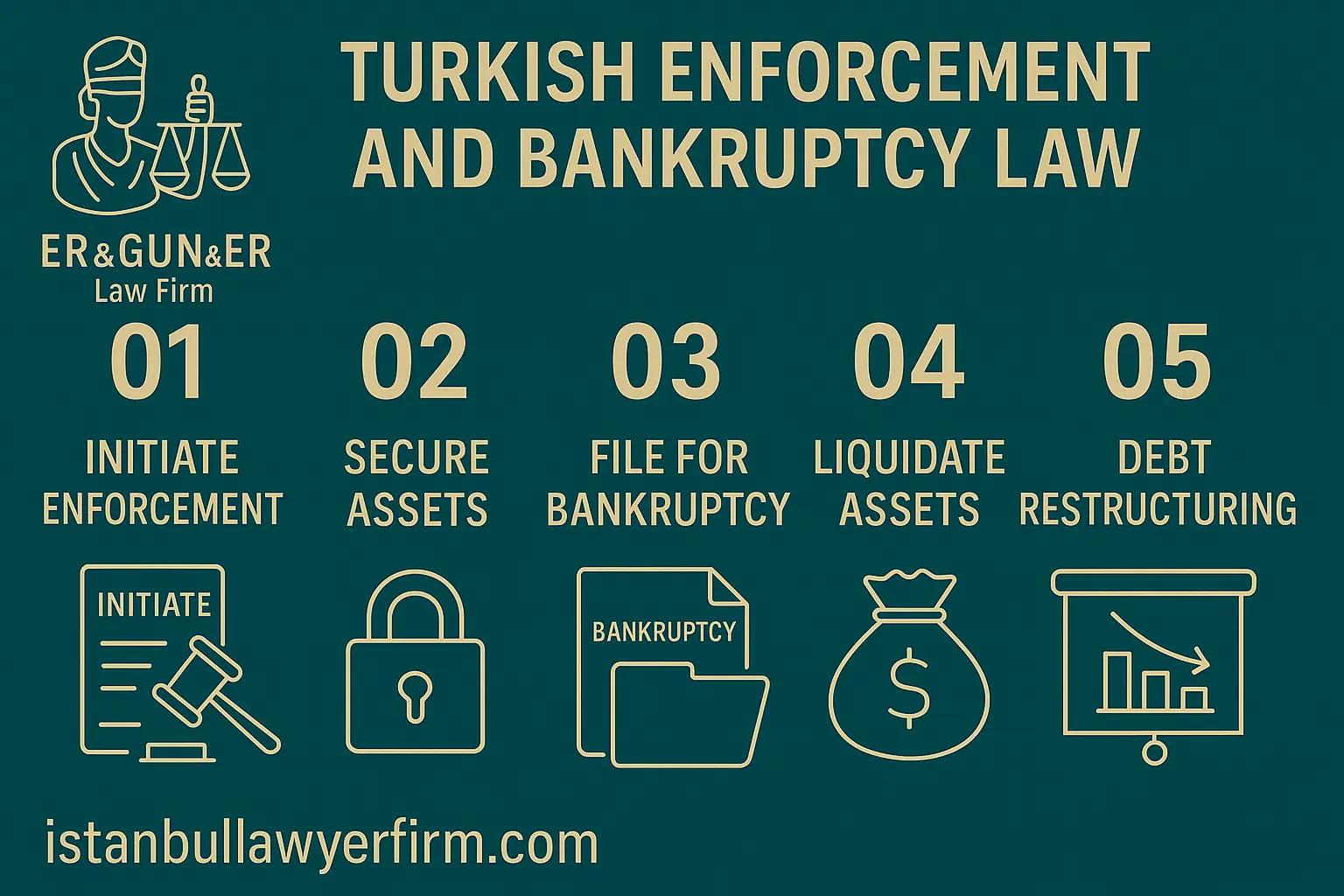
Enforcement and bankruptcy law in Turkey provides legal mechanisms for creditors to recover outstanding debts, seize assets, and initiate insolvency procedures when individuals or companies fail to meet their financial obligations. Governed by the Turkish Enforcement and Bankruptcy Code (İİK), this area of law encompasses forced execution, precautionary attachment, debt collection litigation, restructuring, and liquidation. At Istanbul Law Firm, our experienced English speaking lawyers in Turkey represent creditors and debtors in all stages of enforcement and bankruptcy proceedings.
Whether you’re pursuing recovery of unpaid invoices, resisting unjust enforcement actions, or restructuring corporate liabilities, we provide fast, strategic legal solutions tailored to Turkish and international clients. Recognized as a best lawyer firm in Turkey for commercial enforcement, our team ensures due process, asset security, and financial recovery. Related: How to Collect Debt Legally in Turkey, Understanding Corporate Bankruptcy Under Turkish Law
Debt Recovery and Enforcement Proceedings in Turkey
Debt collection in Turkey can be initiated through legal enforcement proceedings (icra takibi) without the need for a prior court judgment, especially in cases of unpaid commercial invoices, promissory notes, or contracts. Creditors may file enforcement applications through Enforcement Offices (İcra Dairesi), triggering a notification to the debtor who has seven days to object. If no valid objection is made, the creditor may proceed to asset seizure, bank account blocking, or property liens. At Istanbul Law Firm, we represent domestic and foreign clients in initiating and managing all types of enforcement procedures, including general and special execution processes.
Our English speaking lawyers in Turkey prepare and submit payment orders, track objections, and initiate court litigation if the debt is contested. We also apply for precautionary attachment (ihtiyati haciz) in urgent cases where there is a risk of asset dissipation. For foreign clients, we assist with cross-border debt recovery and enforceable foreign judgments under international conventions such as the New York Convention and bilateral agreements.
As a best lawyer firm in Turkey for enforcement law, Istanbul Law Firm delivers precise, fast-acting legal solutions to recover debts while respecting due process and minimizing business disruption. Related: Legal Steps to Start Enforcement in Turkey, How to Enforce a Claim Through Asset Seizure
Bankruptcy, Insolvency, and Corporate Liquidation
Bankruptcy proceedings in Turkey are initiated when a debtor is unable to meet their financial obligations and no viable restructuring solution exists. The process is governed by the Turkish Enforcement and Bankruptcy Code (İİK) and involves the declaration of insolvency, court-supervised asset liquidation, and distribution of proceeds to creditors. Corporate bankruptcy can be declared voluntarily by the debtor or initiated by creditors. At Istanbul Law Firm, we assist both companies facing insolvency and creditors seeking recovery through bankruptcy petitions and asset tracing actions.
Our English speaking lawyers in Turkey handle filing of bankruptcy requests, representation at commercial courts, and coordination with bankruptcy administration panels. We assess financial records, negotiate with creditors, and guide debtors through the liquidation or restructuring process. In cross-border insolvency matters, we work with international counsel to ensure recognition of Turkish proceedings or enforceability of foreign rulings. We also represent stakeholders in challenging unfair creditor preferences or fraudulent transfers made before bankruptcy.
Recognized as a best lawyer firm in Turkey for insolvency law, Istanbul Law Firm provides strategic legal and commercial guidance in high-risk financial scenarios. We protect client interests, preserve viable businesses, and manage creditor communications in complex financial breakdowns. Related: Legal Framework for Bankruptcy and Insolvency in Turkey, Corporate Dissolution and Liquidation Procedure
Precautionary Attachment and Asset Protection Strategies
Precautionary attachment (ihtiyati haciz) is a powerful legal tool in Turkish law that allows creditors to temporarily seize a debtor’s assets before a final judgment is obtained, reducing the risk of asset dissipation or fraudulent transfers. It is particularly useful in cases involving unsecured commercial claims or suspected insolvency. At Istanbul Law Firm, we file urgent precautionary attachment petitions and represent clients in proving legal grounds such as creditor risk and credible receivables. The court may order asset freezing, bank account blocking, or third-party seizure pending final resolution.
Our English speaking lawyers in Turkey prepare legal briefs, obtain guarantees when required, and cooperate with enforcement offices to execute orders swiftly. We also act preemptively to protect our clients’ assets from being unjustly seized, including filing for release of wrongfully attached property and contesting illegal enforcement actions. For companies, we advise on risk management strategies, contractual clauses, and legal structures to safeguard critical assets against execution risks.
As a best lawyer firm in Turkey for asset enforcement, Istanbul Law Firm balances creditor recovery with strategic asset protection—whether defending or initiating enforcement. Related: When Can You Use Precautionary Attachment in Turkey?, How to Protect Assets from Unlawful Seizure
Debt Restructuring, Concordat, and Settlement Procedures
When businesses face temporary financial hardship but have potential for recovery, Turkish law provides formal debt restructuring mechanisms such as concordat (konkordato) to avoid bankruptcy. A concordat allows a company to propose a payment plan to creditors under court supervision, gaining temporary protection from enforcement. At Istanbul Law Firm, we assist distressed companies in preparing concordat filings, negotiating with creditors, and obtaining court approval. We also guide clients in informal settlement agreements, balance sheet restructuring, and creditor arrangement protocols that can prevent insolvency and preserve business continuity.
Our English speaking lawyers in Turkey work with financial advisors, accountants, and management teams to draft realistic repayment plans, obtain auditor certification, and present legal arguments to commercial courts. We also represent creditors challenging concordat filings that are fraudulent or unviable. Throughout the process, we protect client assets and stakeholder rights while preserving contractual relationships essential to recovery.
As a best lawyer firm in Turkey for commercial restructuring, Istanbul Law Firm offers strategic legal planning, litigation support, and proactive negotiation for financially troubled businesses. Related: How Concordat Works Under Turkish Law, Legal Options for Restructuring Debt Before Bankruptcy
Why Istanbul Law Firm Is the Leading Legal Advisor in Turkish Enforcement and Bankruptcy Law
Financial disputes, debt collection, and insolvency cases demand not only speed but strategic precision and legal foresight. At Istanbul Law Firm, we represent creditors, debtors, and commercial entities across all stages of Turkish enforcement and bankruptcy proceedings. Our legal team brings decades of courtroom and enforcement experience, navigating complex procedures with efficiency, transparency, and bilingual legal support. We prioritize results—whether it's recovering unpaid debts, protecting assets, or guiding clients out of insolvency through legal restructuring.
Our English speaking lawyers in Turkey offer international-standard service for companies, investors, and private clients with cross-border claims, enforcing foreign judgments or protecting international business interests in Turkey. We handle multi-party disputes, mass creditor settlements, and urgent seizure orders with full procedural compliance and risk analysis. From high-stakes asset protection to tactical execution of recovery actions, we deliver legally enforceable solutions aligned with business objectives.
Recognized as a best lawyer firm in Turkey for enforcement and bankruptcy, Istanbul Law Firm is your legal shield when financial exposure demands fast, firm, and professional action. Related: Why You Need a Lawyer in Turkish Enforcement Proceedings, Restructuring vs. Bankruptcy in Turkish Commercial Law
Frequently Asked Questions (FAQ)
- How can I legally collect a debt in Turkey? – You can file an enforcement proceeding through an enforcement office, even without a court judgment. We prepare and file the necessary legal documents.
- What is precautionary attachment? – It allows creditors to freeze a debtor's assets before a final ruling, with court approval. We file urgent requests and enforce court orders swiftly.
- Can foreign creditors enforce debts in Turkey? – Yes. We assist foreign creditors in enforcing judgments or initiating local proceedings under international conventions.
- What happens if a company goes bankrupt in Turkey? – Its assets are liquidated and proceeds are distributed to creditors under court supervision. We represent both debtors and creditors in bankruptcy courts.
- Is it possible to stop enforcement action once it starts? – Yes, through objections, court filings, or settlement. We defend clients from unjust or excessive enforcement demands.
- What is concordat? – A legal restructuring procedure that protects companies from enforcement while they negotiate with creditors. We prepare filings and negotiate approval.
- How long does a bankruptcy process take? – It varies by case complexity. We manage deadlines, court hearings, and creditor notifications throughout the process.
- Can assets be seized without court permission? – No. All seizures require legal authority via court order or enforcement office approval. We ensure legal protections are followed.
- Are personal assets at risk in company debt? – Possibly, in sole proprietorships or if guarantees are signed. We provide asset protection and legal structuring solutions.
- Can enforcement be applied against foreigners in Turkey? – Yes. Any debtor with assets in Turkey can be subject to enforcement, including foreign individuals and entities.
- What happens if a debtor hides assets? – It may be challenged as fraudulent conveyance. We file lawsuits and injunctions to recover concealed or transferred property.
- Who is the most experienced enforcement law firm in Turkey? – Istanbul Law Firm—a best lawyer firm in Turkey—offering strategic debt recovery, bankruptcy defense, and creditor protection.
Contact Our Turkish Enforcement and Bankruptcy Lawyers
Whether you're recovering a business debt, resisting wrongful seizure, or navigating corporate insolvency, Istanbul Law Firm provides experienced, fast, and strategic legal support. Our English speaking lawyers in Turkey handle enforcement filings, asset protection, and bankruptcy litigation with precision. As a best lawyer firm in Turkey for commercial recovery, we act swiftly to protect your rights and recover your claims. Contact us today for a tailored enforcement strategy or bankruptcy defense.


